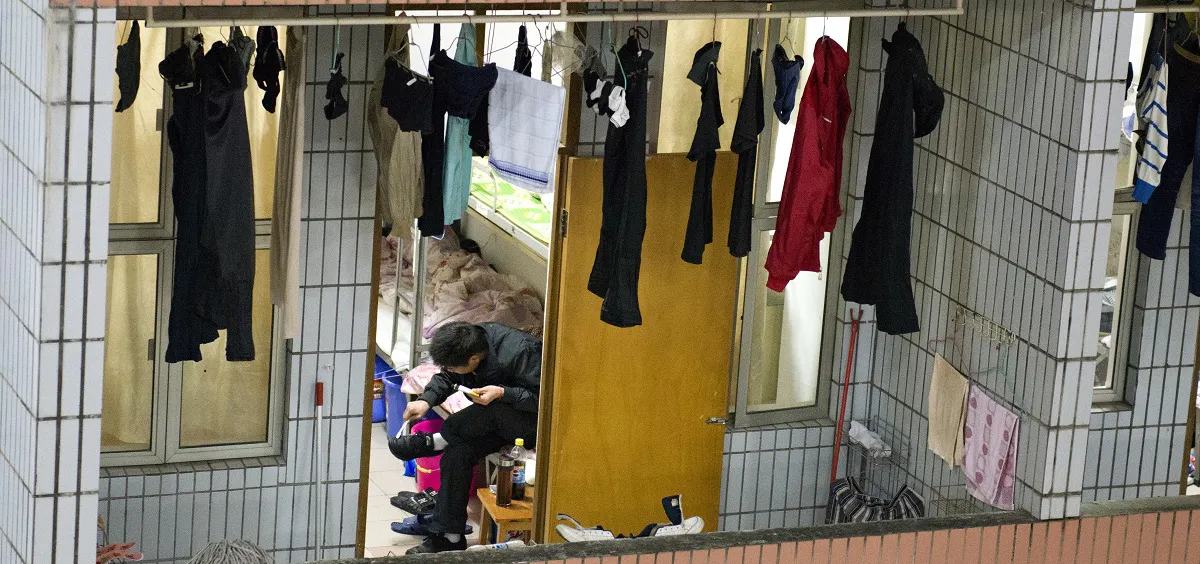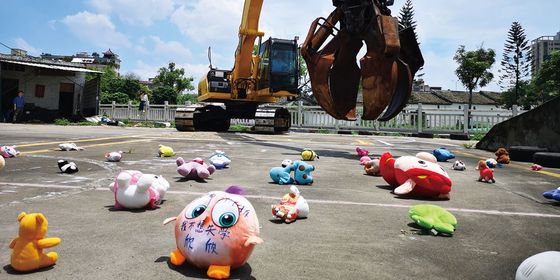Workers, loneliness, and “silicone doll experiences”
Over the last three decades, as China has become the “world’s factory,” millions of workers have left their homes in the countryside to work in manufacturing in the cities.
Migrant workers come to make more money than they would earn at home in the fields, but while material wants can be satisfied through their improved salary, the crowded dormitories and distance from home mean that these workers suffer from a more sensitive deficit—sexual fulfillment.
This October, reports about sex doll experience centers in Nanning, Guangxi Zhuang Autonomous Region, generated widespread social debate. Similar experience halls also exist in Shenzhen, Beijing, Hangzhou, and elsewhere. Renting out rooms by the hour stocked with silicone dolls (often dressed in costumes) and other sex toys, this emerging industry serves the sexual desires of usually migrant male customers, but has also prompted concerns around safety, health, and morality.
Zhao Lin, the owner of one such experience center in Nanning, told reporters from The Paper that he saw first hand the difficulties workers face finding companionship when he was employed as a construction worker for over 10 years. Most workers are male, live in shared dormitories, and lack the time or money to enjoy a vibrant social life, so finding a date is difficult.
Often times, scammers prey on these workers’ desire for companionship. Li Bo, who founded China’s first sex doll experience center, told e-commerce website Yitiao he once encountered a customer who claimed he had previously been scammed by a woman he met online. After he arrived the woman’s house, several men suddenly burst in, claimed they had caught him in the act of adultery, and extorted all the cash he had.
In the absence of dating, some workers have begun taking silicone girlfriends instead. On e-commerce sites, dolls are available for rent for around 99 to 398 RMB, depending on the duration. It is affordable on the salary of a blue-collar Nanning worker, which online recruitment ads show to be between 5,000 and 8,000 RMB per month.
China’s first silicone doll center, the “Love and Pleasure Experience Hall,” opened in Shenzhen in September 2018. It is a ten-minute walk from an industrial park operated by Foxconn, a Fortune 500 company that and employs 400,000 people in its factories, and has become notorious for long hours and poor working conditions leading to worker suicides.
The halls are popular with workers in Shenzhen, but draw health and safety concerns. According to a report by The Paper in June, many businesses do not thoroughly disinfect the dolls between customers. A reporter, pretending to be a customer, used a pen to leave marks on the dolls. These were found by a second undercover reporter on the same doll hours later, though the business-owner had claimed that dolls were thoroughly disinfected after every use.
At present, there are no standards for hygiene inspection for the industry—official inspection are aimed at ensuring businesses are licensed and operating legally. According to Zhao, disinfection is costly: “We need to carry the heavy dolls (between 70 and 140 kilograms) to wash them, perform hydrogen peroxide and ultraviolet disinfection, and then return them. The costs of labor and disinfection are really high, leaving a small profit margin.” One anonymous netizen even shared his experience of getting sick after using unsterilized dolls via consumer review app Dianping.
While silicone doll halls do not violate any laws, some netizens question whether the secluded rooms of these businesses may provide a convenient front for human prostitution. In 2017, silicone doll-sharing app Taqu was taken offline ahead of major political meetings in Beijing, and criticized for misogynistic ads portraying sex dolls in handcuffs as “submissive” girlfriends. It later apologized for creating “negative impact on online discourse” and a “bad influence on society.”
Peng Xiaohui, professor at the School of Life Sciences at Central China Normal University, told The Paper that the silicone doll phenomenon is only “a short-term supplementary measure for solving workers’ deficit of interpersonal sexual relations.” For workers who are away from long periods from their spouses—or are part of China’s mushrooming demographic of single, usually rural men (“bare branches”) facing a lifetime of potential celibacy—sex doll renting services could be a legal and less embarrassing alternative to hiring prostitutes, and lower the risk of STDs, unwanted pregnancy, and interpersonal conflict in a casual sexual relationship.
In the long term, though, the imbalance of social and sexual access created by China’s wealth and demographic gaps remain. “I used to see five or six workers who came together and rented out one room,” Zhao, the business-owner in Nanning, said in another interview with China Youth Daily. “When they left, I went to disinfect the room, only to find the doll with broken hands and feet. From this, I could tell that workers are sexually repressed and need an outlet.”
Cover image from VCG












